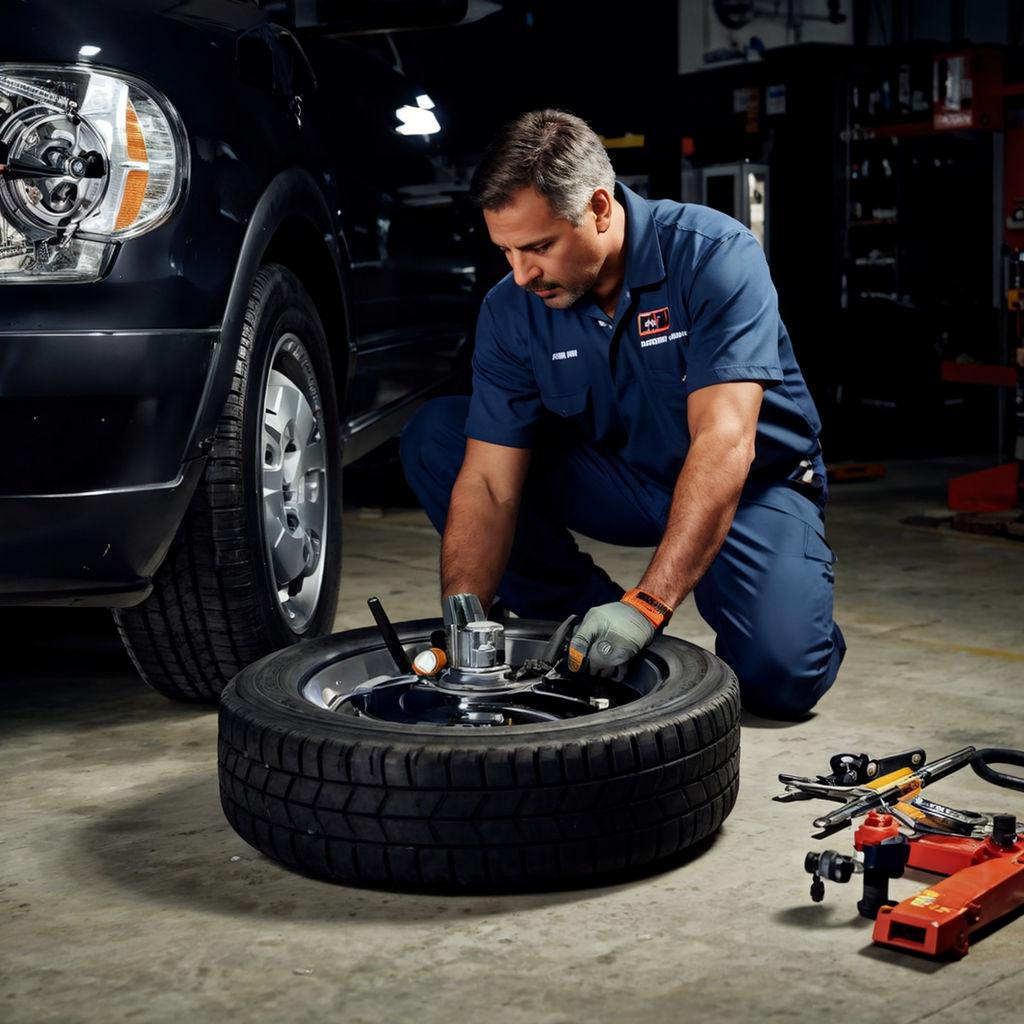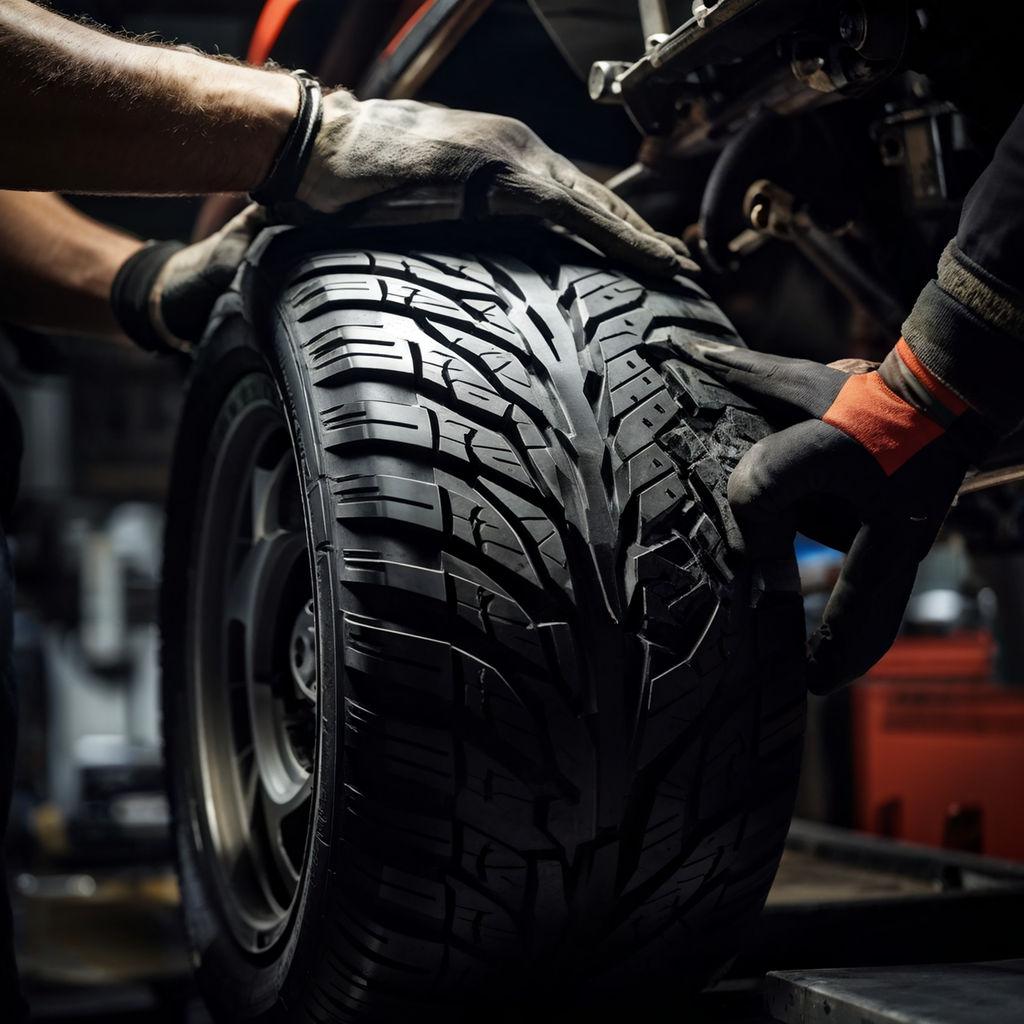- Key Takeaways
- Why Tire Maintenance Matters
- Basics of Tire Upkeep
- Regular Pressure Checks
- Rotate Tires for Even Wear
- Spotting Tire Issues Early
- Balancing for Smooth Rides
- Boost Fuel Efficiency
- Using Your Spare Tire
- Safety and Savings
- Closing Thoughts
- Frequently Asked Questions

Maintaining your tires is not just about keeping them inflated; it’s about ensuring your safety on the road. The importance of tire maintenance cannot be overstated. Neglecting this crucial aspect can lead to decreased fuel efficiency, poor handling, and even dangerous blowouts. By contrast, regular tire check-ups and rotations can extend their lifespan, improve performance, and enhance overall driving experience. Don’t wait until you’re stranded on the side of the road to realize the significance of proper tire care. Stay ahead of potential issues by prioritizing routine maintenance and inspections.
Key Takeaways
- Regular tire maintenance is crucial for safety, savings, and optimal vehicle performance.
- Check tire pressure regularly to ensure proper inflation and improve fuel efficiency.
- Rotate tires at recommended intervals to promote even wear and extend their lifespan.
- Keep an eye out for early signs of tire issues such as uneven wear, bulges, or cracks.
- Balancing your tires helps provide a smoother and more comfortable driving experience.
- Utilize your spare tire properly by ensuring it is in good condition and maintaining the correct pressure.
Why Tire Maintenance Matters
Safety Implications
Neglecting tire maintenance can lead to serious safety risks. Poor tire maintenance such as ignoring tire wear and not checking tire pressure regularly can result in blowouts or loss of control while driving. These issues can significantly increase the likelihood of accidents on the road.
Regularly inspecting your tires for signs of wear and tear is crucial for ensuring your safety on the road. By maintaining proper tire condition, you reduce the risk of unexpected tire failures that could potentially lead to dangerous situations.
Vehicle Performance
The important tire condition directly impacts your vehicle’s performance. Proper tire maintenance, including regular rotation and alignment checks, ensures that your tires wear evenly, leading to better handling and traction. This results in a smoother and safer driving experience for you and your passengers.
Maintaining optimal tire life through routine inspections and pressure checks also contributes to fuel efficiency. When your tires are properly inflated, your vehicle requires less energy to move, ultimately saving you money on fuel costs over time.
Financial Benefits
Investing in regular tire maintenance pays off financially in the long run. By extending the lifespan of your tires through proper care, you avoid the need for premature replacements, which can be a significant expense. Well-maintained tires contribute to better fuel economy, saving you money at the pump.
Proper tire care also helps prevent uneven wear, which can lead to costly repairs down the line. By addressing issues early through consistent maintenance, you can avoid more extensive and expensive problems with your vehicle’s suspension and alignment.
Basics of Tire Upkeep
Essential Steps
Maintaining your tires involves basic tire care routines such as regular tire inspections and proper tire maintenance. By following a reliable tire maintenance schedule, you can ensure good tire safety and increase the longevity of your tires.
Regularly checking your tires for wear and tear is essential to detect any issues early on. Ensuring that your tires are properly inflated according to the manufacturer’s recommendations is crucial for optimal performance and safety.
Common Causes
One of the common causes of tire wear and tear is improper inflation levels. When tires are underinflated, they wear out faster on the edges, leading to reduced tire life. Overinflated tires, on the other hand, wear out more in the center, affecting stability and traction.
Another factor contributing to tire wear is poor wheel alignment. Misaligned wheels can cause uneven tire wear, affecting handling and fuel efficiency. Driving habits such as harsh braking and speeding can accelerate tire deterioration.
Importance of Tire Inflation
Proper tire inflation is vital for maintaining tire longevity and ensuring optimal performance. Underinflated tires can lead to increased rolling resistance, reducing fuel efficiency and causing premature wear. On the other hand, overinflated tires can result in a harsher ride and decreased traction.
Maintaining the recommended tire pressure not only enhances safety but also improves handling and braking performance. It helps distribute the vehicle’s weight evenly across the tires, promoting even wear and extending tire life.
Regular Pressure Checks
Safety Importance
Regular pressure checks are crucial for ensuring optimal safety on the road. Incorrect tire pressure can lead to increased risk of accidents, especially during sudden maneuvers or emergency stops. Maintaining proper tire pressure enhances vehicle stability and traction, reducing the likelihood of skidding or loss of control.
Fuel Efficiency Impact
Tire pressure significantly influences fuel efficiency. Underinflated tires increase rolling resistance, causing the engine to work harder and consume more fuel. By maintaining ideal tire pressure levels, drivers can improve gas mileage and reduce their overall fuel expenses. Properly inflated tires also contribute to reduced carbon emissions, benefiting both the environment and the wallet.
Optimal Pressure Maintenance Tips
- Regularly check tire pressures using a reliable gauge.
- Refer to the vehicle’s manual for recommended pressure limits.
- Inflate tires to the ideal pressure specified by the manufacturer.
- Monitor air pressure monthly, especially before long trips or in extreme weather conditions.
- Consider investing in a quality air compressor for convenient at-home maintenance.
Rotate Tires for Even Wear
Tire Rotation
Tire rotation is essential to prevent uneven tire wear and extend the lifespan of your car tires. By regularly rotating your tires, you ensure that they wear evenly, promoting good tire health and longevity.
Regular tire rotation helps maintain balanced handling and traction on the road. It ensures that all four tires wear out uniformly, enhancing overall driving performance and safety.
Frequency Recommendation
Experts recommend rotating tires every 5,000 to 7,500 miles or as per your vehicle manufacturer’s guidelines. This routine maintenance task is crucial in maximizing the lifespan of your new tires.
When you rotate your tires, you shift each tire to a different position on your vehicle. This process helps balance out the wear that naturally occurs due to various factors like weight distribution and driving habits.
Benefits of Tire Rotation
- Extended tire life
- Improved fuel efficiency
- Enhanced traction and handling
Rotation Patterns
There are several common rotation patterns used by mechanics:
- Forward Cross: Front tires move straight back, rear tires crisscross to the front.
- X-Pattern: Diagonal pattern where each tire moves to the opposite end.
- Side-to-Side: Rear tires move straight up, front tires switch sides.
Regularly checking your tires for signs of irregular wear can indicate if it’s time for a rotation. Look for differences in tread depth or unusual patterns that may suggest alignment issues.
Spotting Tire Issues Early
Recognizing Signs
Inspect tires regularly for any signs of damage, such as cuts, cracks, or bulges. Look for uneven wear patterns on the tire surface. Check tire pressure monthly to ensure they are properly inflated, preventing premature tire wear and potential tire failure.
Identifying Tire Bubbles
Be vigilant for tire bubbles, which are bulges on the tire sidewall or tread caused by air leaking into the inner layers. Tire bubbles can lead to sudden tire destruction or even unsafe tire explosions while driving at high speeds.
Importance of Tread Depth Checks
Regularly measure tread depth using a tread depth gauge to ensure it meets the recommended levels for safe driving. Inadequate tread depth increases the risk of hydroplaning on wet roads and reduces traction, leading to accidents.
Balancing for Smooth Rides
Preventing Vibrations
Tire balancing plays a crucial role in ensuring a smooth driving experience by preventing vibrations. When tires are not balanced correctly, they can cause the steering wheel to shake and the vehicle to vibrate, leading to discomfort for the driver and passengers. By distributing the weight evenly across all tires, vibrations are significantly reduced, resulting in a more pleasant and stable ride.
Extending Tire Lifespan
One of the key benefits of tire balancing is its impact on tire wear. When tires are unbalanced, certain areas of the tire tread may wear out faster than others, leading to uneven wear patterns. This not only compromises the overall performance of the tire but also shortens its lifespan. Properly balanced tires ensure that the tread wears evenly, extending the life of the tire and saving you money in the long run.
Importance of Load Capacity
Considering the load capacity of your vehicle is essential when it comes to tire balancing. Each tire has a specific load rating that indicates the maximum weight it can support safely. Ignoring this factor can lead to overloading the tires, causing them to wear out quickly and increasing the risk of a blowout. By maintaining proper tire balance according to the manufacturer’s recommendations, you can ensure that your tires can handle the load placed on them.
Tips for Effective Balancing
To achieve optimal tire balance, regular maintenance is key. Scheduling alignment checks and tire rotations as recommended by your vehicle’s manufacturer can help prevent imbalances and ensure a smooth ride. Consulting with a professional mechanic for balancing tips tailored to your specific driving habits and road conditions can further enhance the performance and longevity of your tires.
Boost Fuel Efficiency
Tire Pressure
Maintaining proper tire pressure is crucial for optimizing fuel efficiency. Under-inflated tires increase rolling resistance, leading to more fuel consumption. On the other hand, over-inflated tires can reduce the contact patch with the road, impacting traction and fuel efficiency negatively.
Tire Tread Depth
Adequate tire tread depth is essential for fuel efficiency. Worn-out treads can lead to reduced traction and stability, resulting in increased fuel consumption. Regularly checking and replacing tires with sufficient tread depth can significantly improve fuel efficiency.
Wheel Alignment
Proper wheel alignment plays a vital role in fuel efficiency. Misaligned wheels can cause uneven tire wear, leading to increased rolling resistance and fuel consumption. Ensuring correct wheel alignment through regular maintenance can help maximize fuel efficiency.
Tire Rotation
Regular tire rotation is key to maintaining fuel efficiency. Rotating tires helps ensure even wear across all tires, promoting balanced performance and longevity. By following a consistent tire rotation schedule, you can enhance fuel efficiency and extend the lifespan of your tires.
Using Your Spare Tire
Emergency Situations
When faced with a flat tire, using your spare tire is crucial. Ensure your vehicle is parked on a flat surface before beginning the tire change process. Loosen the lug nuts before lifting the vehicle with a jack securely placed under the frame.
In case of emergencies, spare tires provide a temporary solution. They are designed to be smaller and lighter than regular tires, allowing for easier storage in vehicles. Remember that spare tires are typically not meant for long-term use or extended driving.
Limitations and Considerations
Spare tires have limitations that drivers should be aware of. Due to their compact size and design, spare tires are not suitable for high speeds or long distances. It’s essential to drive cautiously and avoid exceeding speed limits when using a spare tire.
When using a spare tire, it’s crucial to keep in mind that they are often designed for temporary use only. Most spare tires have specific mileage limitations, usually ranging from 50 to 70 miles. Therefore, it’s advisable to replace the spare tire with a regular one as soon as possible.
Importance of Maintenance
Regularly maintaining your spare tire is as important as caring for your regular tires. Check the air pressure of your spare tire at least once a month to ensure it is properly inflated. Properly inflated spare tires can provide better stability and performance in emergency situations.
Maintaining your spare tire includes checking its condition periodically. Inspect the tread depth and overall condition of the spare tire to ensure it is in good shape and ready for use when needed. Storing your spare tire in a clean, dry place can help prolong its lifespan.
Safety and Savings
Safer Driving
Regular tire maintenance is crucial for ensuring safety on the road. By keeping tires properly inflated and regularly checking their condition, drivers can significantly reduce the risk of accidents. Properly inflated tires provide better traction, improving vehicle control in various weather conditions. Over time, worn-out tires can lead to blowouts, increasing the chances of accidents and damage to the vehicle.
Cost Savings
One of the key benefits of consistent tire care is the potential for significant savings. Maintaining proper tire pressure helps improve fuel efficiency, saving money on gas in the long run. Well-maintained tires wear out more evenly, extending their lifespan and reducing the frequency of replacements. This proactive approach not only saves money on tire replacements but also prevents unexpected breakdowns that could result in costly repairs.
Accident Prevention
Proper tire maintenance plays a critical role in preventing accidents and breakdowns. Irregular tire wear patterns can indicate underlying issues with the vehicle’s alignment or suspension, which, if left unaddressed, could lead to dangerous driving conditions. By regularly inspecting tires for signs of wear and tear, drivers can address potential problems early on, reducing the risk of sudden tire failures while on the road.
Closing Thoughts
Ensuring your tires are well-maintained is crucial for your safety, savings, and overall driving experience. By following the basics of tire upkeep, checking pressure regularly, rotating tires, and spotting issues early, you not only enhance safety but also extend the lifespan of your tires. This proactive approach can lead to smoother rides, improved fuel efficiency, and significant cost savings in the long run.
Take charge of your vehicle’s maintenance today by incorporating these tire care practices into your routine. Your safety on the road and the longevity of your tires depend on these simple yet impactful steps. Stay informed, stay proactive, and enjoy a safer and more cost-effective driving experience.
Frequently Asked Questions
What are the benefits of regular tire maintenance?
Regular tire maintenance ensures optimal performance, extends tire lifespan, improves fuel efficiency, enhances safety on the road, and saves you money in the long run.
How often should I check my tire pressure?
Check your tire pressure at least once a month or before long trips. Proper tire pressure ensures safety, improves fuel efficiency, and prevents uneven wear.
Why is rotating tires important?
Rotating tires promotes even tread wear, extends tire life, improves handling and traction, and ensures a smoother ride for your vehicle.
When should I consider using my spare tire?
Use your spare tire only in emergencies when you have a flat tire. Remember that spare tires are typically temporary solutions and should be replaced with a regular tire as soon as possible.
How can I spot early signs of tire issues?
Look out for signs such as uneven wear, bulges, cracks, vibrations, or low tread depth. Addressing these issues promptly can prevent accidents and costly repairs.

